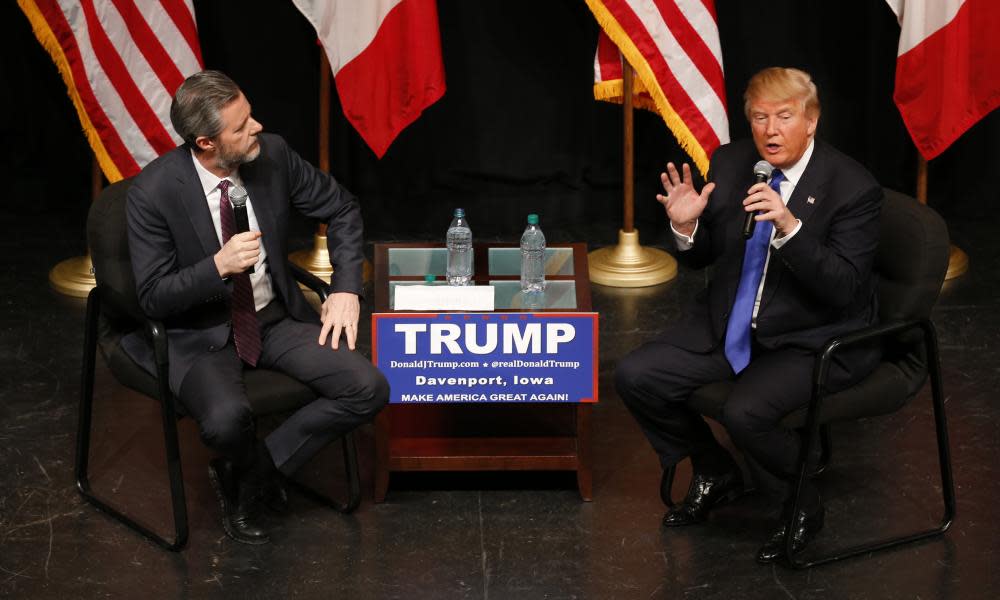Jerry Falwell's Liberty University dogged by growing claims of corruption

Since January 2016, when the head of Liberty University, Jerry Falwell Jr, endorsed Donald Trump for president, the influential evangelical university has been on a fast-track to the heart of American politics. Since being credited with helping Trump earn the loyal support of the Christian right, Falwell has become a regular presence at the White House.
Meanwhile, the university, founded in 1971 by his late father, the Rev Jerry Falwell Sr, has expanded exponentially. Under Falwell Jr’s leadership, the Lynchburg, Virginia, not-for-profit university’s assets have reportedly grown from $259m in 2007 to over $3bn and it has more than 100,000 students.
But lately, a series of alleged scandals appear to be threatening Falwell’s grip on power. And this week, the stakes were raised even higher amid accusations of corruption and Falwell’s own demand for an FBI investigation.
Related: Christian leader Jerry Falwell urges Trump support: 'He’s a moral person'
On Monday, Politico published a report, citing more than 24 current and former “high-ranking” Liberty officials, which claims they are losing confidence in him. Falwell, it alleges, “presides over a culture of self-dealing, directing university resources into projects and real estate deals in which his friends and family have stood to make personal financial gains”.
Jim Guth, politics and international affairs professor at Furman University and an expert on the religious right, said: “There’s becoming a lot of unease within the Liberty network among people in response to all of these kinds of reports that have been circulating for the last couple of years and seem to be becoming more serious, and I think that in some ways parallels what’s going on in the larger evangelical community politically. And although it’s remained very much supportive of Mr Falwell’s favorite politician, President Trump, there seem to be increasing cracks in that approval – and I think that the same thing is happening in terms of Falwell’s image within his network.”
Conservative evangelicals’ preference for “strong political leaders”, he said, can make it difficult to criticize authorities, but he thinks growing pressure on Falwell could result in a leadership challenge.
“I’m not quite sure what to expect from this point on. I think that given the kind of developing opposition and concern on the board and elsewhere at Liberty, you may see his leadership challenged within the organization in the next few months.”
In the last year, Falwell has been linked to university business deals that allegedly benefitted his personal trainer, Benjamin Crosswhite, whom he reportedly helped to buy university property. Falwell also allegedly had close dealings with Michael Cohen, Trump’s disgraced former personal lawyer.
Cohen, who is serving a three-year prison sentence, said he helped the university president deal with some racy “personal” photographs in 2015. Falwell has denied these claims.
In January, the Wall Street Journal reported that John Gauger, owner of RedFinch Solutions LLC and Liberty’s chief information officer and vice-president of analytics, was hired by Cohen to try to rig online polls to favor Trump before the presidential campaign. He was also reportedly asked to create the @WomenForCohen account – which described him as a “strong, pit bull, sex symbol” – to raise his profile.
The recent Politico article alleges Falwell hired his son Trey’s company to manage a university-owned shopping center, loaning university money and awarding university contracts to friends. “We’re not a school; we’re a real estate hedge fund,” one source reportedly said.
The magazine also published photos of Falwell and Trey on the dance floor of a Miami nightclub in 2014, prompting Falwell to claim that the pictures had been “photoshopped”. Liberty is strict about such activities – students can reportedly be punished with “demerits” for dancing with members of the opposite sex and can face expulsion for drinking.
On Tuesday Falwell issued a dramatic response to the article. He declared it an “attempted coup” and a “criminal” smear campaign and claimed he would be asking the FBI to investigate.
“I’m not going to dignify the lies that were reported yesterday with a response, but I am going to the authorities and I am going to civil court,” he told the Associated Press, calling its reporter a “little boy”.
The FBI declined to comment.
On Thursday, Reuters published claims that Falwell in emails had referred to a student as “emotionally imbalanced and physically retarded” and the university police chief as a “half-wit”. Liberty has not commented on the report.
Liberty declined a request for comment on the Politico claims but directed the Guardian to a 19-page document published on Friday on the university website. Titled “Omitted statements of Liberty University regarding business transactions recently questioned in media”, it claims to list information provided to three publications, adding: “All chose to not report Liberty University’s side, leaving an unbalanced public narrative in place.”
While Falwell may have proved pivotal to Trump’s election in 2016 – and universities like Liberty remain an important platform for Republicans – his political influence could be on the wane.
Kyle Kondik, managing editor of Sabato’s Crystal Ball at the University of Virginia Centre for Politics and author of The Bellwether: Why Ohio Picks the President, said: “From Trump’s perspective, he is a proven commodity now with white evangelical Christians to the point where I don’t think he needs outside validation from figures in the white evangelical movement such as Falwell … It also leads on to the question [of] how much value Mike Pence has to Trump now.”

 Yahoo News
Yahoo News 
